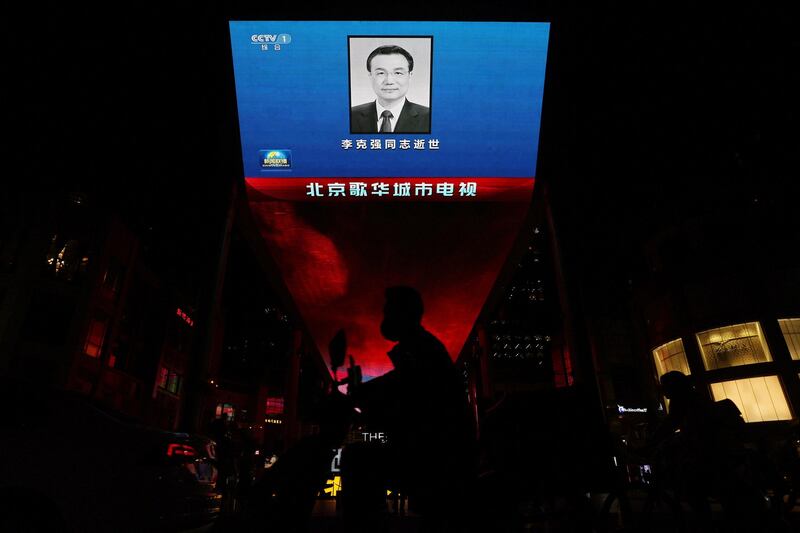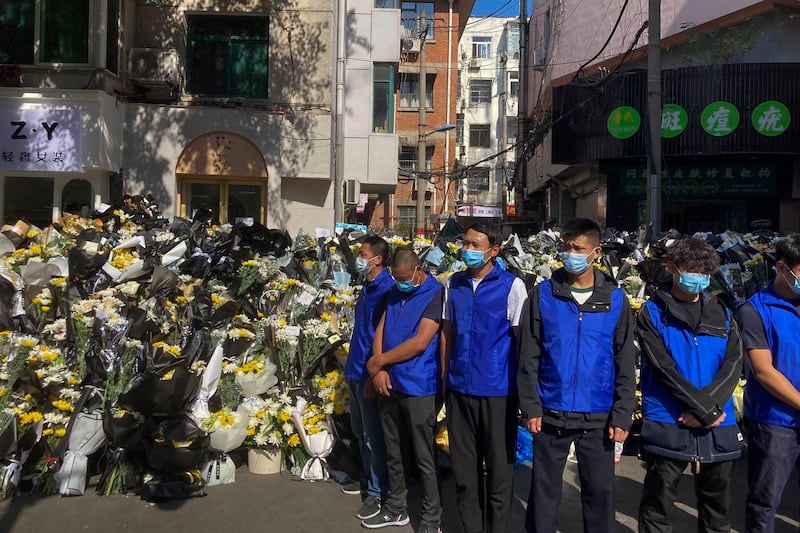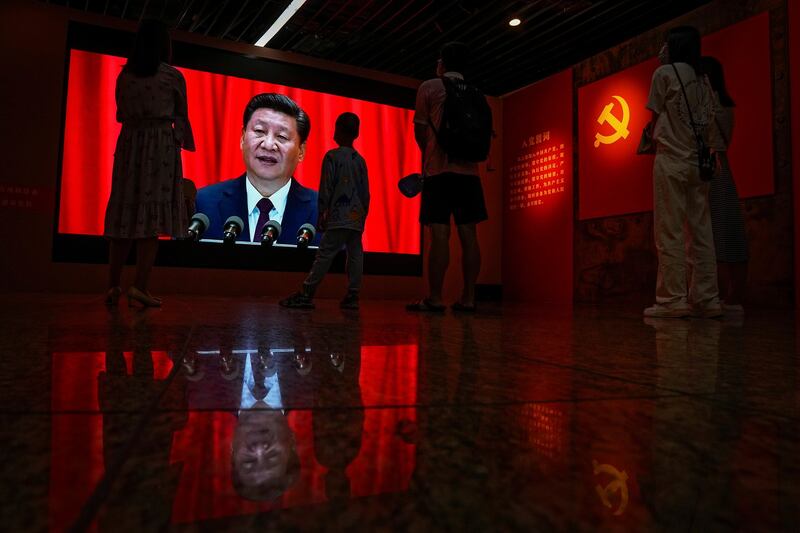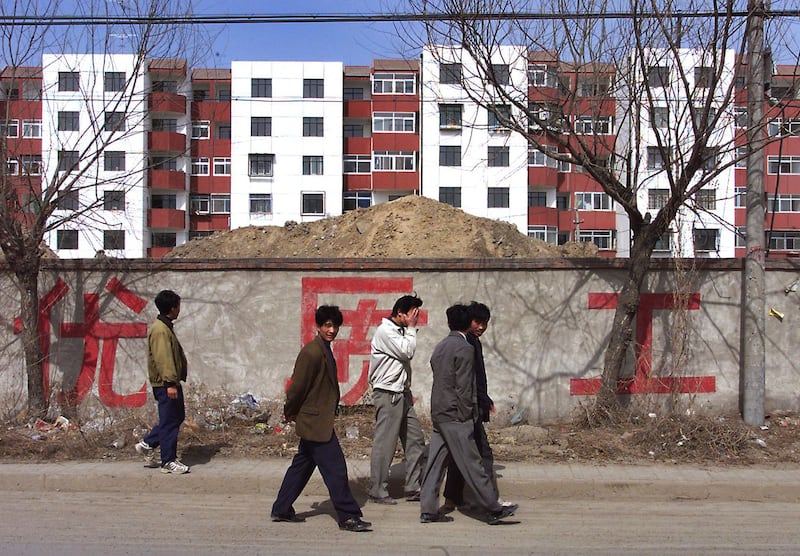Cai Xia, a retired professor of the Central Party School of the Chinese Communist Party, was expelled from the party and had her pension stripped in August 2020 for “serious violations of political discipline” following her criticism of the increasingly authoritarian policies of Xi Jinping, party chief and state president. Xi is meeting with U.S. President Joe Biden this week in California in an effort to stabilize ties between the two powers. In an edited version of an essay published this week by RFA Mandarin, Cai, who has described the ruling party as a political zombie and likened Xi to a “gang boss," shines a light on the reaction within government ranks to the sudden death last month of former premier Li Keqiang:
The mysterious death of former Chinese premier Li Keqiang a couple of weeks ago came as a shock to many. As the massive spontaneous mourning activities grabbed international attention, there was relative silence within party ranks.
Apart from the official death notice, the funeral notice and the slew of obituaries in state media that only deviated from the official version by one or two words, no commemorative articles have been published from within the ranks of the Chinese Communist Party, while comments under official announcements on social media have been switched off.
Yet the death of its once second most-powerful figure in murky circumstances has shocked the Chinese Communist Party throughout its ranks, with a sense of panic and uneasiness plaguing government officials at every level. Everyone is in a cold sweat, watching their back. The crashing silence is the outward manifestation of that shock.
"The rabbit dies and the fox grieves," goes the saying. For many Chinese Communist Party officials, Li's tragic death foreshadows their own inevitable fate.
The fate of Li stems from the institutional evil of totalitarian rule combined with a personal dictatorship that prevails in today's Chinese Communist Party. And Li's fate could befall Chinese Communist Party officials anywhere in the internal party governance system.
After the Chinese Communist Party seized power, officials were largely divided into two key categories: those in charge of party governance and those tasked with running the government.
The party governance system controls the inner workings of the party at every level; the government system controls the machinery of state and society at large.
Party leadership means total party control over all of the power and resources of the state.
In its personified form, it means that party secretaries wield strong and effective control over the People's Congress system, the government and the judiciary at every level. At the Central Committee level, the general secretary tells the premier what to do; at the provincial level, the provincial party secretary tells the provincial governor what to do, and so on, all the way down to the city and county level. In short, party officials are the operatives who party rule into practice, while government officials are just the hired hands expected to maintain it.
All of this meant that Li was unable to prevent Xi Jinping from taking his power away.
Li's 10-year tenure as premier was nothing short of diligent. One of his former classmates wrote of Li that he "cooperated for 10 careful years without a single achievement to show for it," and that he had "lived in frustration and died in vain."
He was right. It was hard for Li to wield any power, as Xi was continually dismantling his independent role, along with the machinery of state, eroding Li's power and taking it for himself.
Xi's 'leading groups'
For example, soon after he took power, Xi set up a number of "leading groups" in the name of reform, and chaired six of them himself. People who have lived through the Cultural Revolution recognized what Xi Jinping was about -- he was imitating [Mao Zedong's wife] Jiang Qing's leadership of the Central Cultural Revolution Leading Group at that time.
According to a recent commentary posted on CPCNEWS "The group is the top of the pyramid in China's political leadership system" and "is actually the body that makes important economic strategic decisions for the country"
As the leader of these groups, Xi was appropriating the powers of the State Council, excluding Li and gradually marginalizing him.
The Central Financial and Economic Leading Group led by Xi was in charge of economic policy-making. Former vice premier Liu He got an important role, and Li was excluded from core decision-making.
Meanwhile, Li never made it into any official news reports on the decision-making and implementation of Xi's Belt and Road Initiative or his "Millennium-plan" city of the future, Xiong 'an New Area."

Li's policy blueprint after assuming the premiership was to "promote China's urbanization as part of the process of industrialization," which included a package of measures he hoped would promote reform and economic development.
But in December 2013, Xi convened an urbanization work conference of the Central Committee of the Communist Party of China in the name of the Party Central Committee that stripped away all of the authority and organizational structures for promoting urbanization that had been under Li's control, integrating the project into Xi's own system of "Leading Groups."
This move shifted the entire structure of power and responsibility within the State Council system.
Li was left without a role again, because the State Council department in charge of urbanization no longer reported to the premier, but directly to Xi, who was head of the "Leading Group."
In February 2018, the Plenary Session of the Central Committee led by Xi decided to carry out a systematic and holistic restructuring of both the party's organizational structure and management system of the Party and of government departments.
After little more than a year of institutional mergers and adjustments, all important and key departments of the government were in the hands of the Party Central Committee.
The departments responsible for public administration remained under the State Council, but all of the key ministries including the Ministry of Finance, the State Development and Reform Commission and the Audit Office were now led and managed by Leading Groups or by Central Party Committees.
Then, all of the departments associated with and having a significant influence on the rule of the Communist Party of China were merged into the central functional organs of the Communist Party of China. For example, the government's Human Resources Department was merged into the party's Central Organization Department, while the General Press and Publication Administration, the State Administration of Radio, Film and Television and China Central Television were placed under the direct management of the party's Central Propaganda Department.
Finally, all of the armed forces that for various reasons had been run by government departments were integrated under the party's Central Military Commission, which takes orders ultimately only from its chairman -- Xi. Under that system, all of the nation's military power was now controlled by a single person.
More powerful than Mao
The "reform of party and government institutions" that happened from 2018-2019 left Xi more powerful than Mao Zedong. Xi had annexed government departments and brought them under the institutional control of the Chinese Communist Party, setting up a preliminary working system through which he could run his party-state.
These three moves by Xi directly undermined the power of the State Council, and turned Li into the weakest prime minister since 1978. Economic decision-making was no longer in the hands of the premier. The State Council was no longer the center of decision-making and operational control of the economy, but had been reduced to a system charged with implementing centrally made decisions -- decisions made by Xi himself.
This made it hard for Li to propose or formulate major policies affecting China's socio economic development, or even to influence and adjust such policies.
Even his attempt at improving the lives of China's poorest people by encouraging street stalls was frustrated by Xi henchmen like Cai Qi.
Nevertheless, Li kept trying to promote government reform and economic growth within the limited means available to him. During his 10 years in office, he reinvented the role of government departments, and promoted the streamlining and delegation of government decision-making.
He had a firm grasp of what it meant to govern by rule of law, and promoted reforms that would simplify bureaucracy and encourage decentralization, optimizing services.
He once said: "Markets can do anything as long as it's not against the law: governments shouldn't do anything unless there is a law allowing it."
He also presided over the simplification and abolition of government regulations, systems and documents that didn't measure up to his vision of decentralization.

During Li's tenure, the State Council eliminated 61 taxes and fees, reducing the tax burden to the tune of 14 trillion yuan, for the benefit of around one billion people. The number of small and medium-sized companies rose from 14 million to 52 million.
When WeChat first appeared, a number of government departments refused to approve its launch. Li resisted that pressure, telling them to take another look at their standards, and WeChat was given the go-ahead.
When the express delivery industry was just developing, some cities wouldn't allow such services to operate. Li told them to make way for new ideas, rather than regulating them out of existence. Today, the vast majority of people use WeChat and express delivery on a daily basis.
Li was always keen to look after the interests of the people at the bottom of the pecking order, improving their income and their lives. He pushed for more affordable housing to be built, turning shanty towns into more than 59 million affordable housing units, giving 140 million low income people their first fixed abode.
After the massive Tianjin explosion of 2015, Li raised the standard compensation payment for temporary workers to 2 million yuan (US$275,862), when previously payments had only ranged from 500,000 to 600,000 yuan (US$68,965 to US$82,760)
Totalitarian rule combined with a personal dictatorship
Chinese politics increasingly happens behind closed doors, so most people don't know any of this about Li. And even if those on the inside know about it, they're afraid to mention it in casual conversation, let alone in public, for fear of reprisals.
So it's wrong to say that Li accomplished nothing during his tenure. He did everything he could, under circumstances that were far from normal.
The fate of Li stems from the institutional evil of totalitarian rule combined with a personal dictatorship that prevails in today's Chinese Communist Party.
And Li's fate could befall Chinese Communist Party officials anywhere in the internal party governance system. Li was trapped in the role of sidekick within the party system.
In such a system, all people can do is play along. When Xi came to power, he weakened the power of the State Council and the premier, placing everything under his top-down command.
The power of party secretaries has been massively expanded at every level of the party, from the Central Committee down to the local level, while the power of local governments has been continually eroded. There is no longer an independent administration to manage public services at all.
The party controls everything, which means that the party secretaries, its personified form, controls all the power and all of the resources.

Xi's chairmanship of the Central Financial and Economic Leading Group means that he controls the country's finances.
Whether a sidekick like a provincial governor or a mayor really knows how much money his government has now depends on the tightness of his relationship with the party secretary. Government officials are now finding it hard to administer government affairs independently, let alone wield any decision-making power in public affairs.
They are now forced into a position where they carry out the orders of their commanding officers, the party secretaries. who take credit for any achievements, relegating their second-in-commands to the shadows.
Government officials who do too well can be looked on unfavorably by their party secretaries, who feel threatened by them. Propaganda departments ensure that news coverage always highlights party leaders over government officials, never allowing the latter to overshadow the former.
A government official's chances of promotion depend on how well they have deferred to and accommodated their party secretary, because the commanding officer will be the one evaluating them.
10-year backlog of grievances
Government officials are the suffering daughters-in-law of the Chinese political system.
Yet if something goes wrong, they are the first to take the blame in any official investigation.
If the sheer severity of the incident isn't enough for the party secretary to deflect blame, the second-in-command will inevitably take the heat. When they talk about "unity" within party ranks, this is what they mean.
Outsiders know nothing of such things, and insiders daren't talk about them.
Li's death triggered an unexpected outpouring of public grief, but also a lot of public comment on his years in power.
Objectively speaking, Chinese people didn't think Li had a great record.

Yet despite many people not rating him very highly, or even commenting disrespectfully, there was still the public mourning, which is strange.
Why? Because widespread public dissatisfaction with Xi's actions had finally found an outlet.
Li's lack of achievement reawakened a 10-year backlog of grievances and feelings of helplessness among Chinese government officials, because his story was a more concentrated version of their own.
Its moral was that any official who wants to accomplish anything good for the Chinese people will be stymied.
Even if they manage to get off to some kind of start, they will eventually wind up chasing their own tails until exhaustion sets in.
Translated by Luisetta Mudie.
The views expressed here are the commentator’s own and do not reflect the position of Radio Free Asia.
